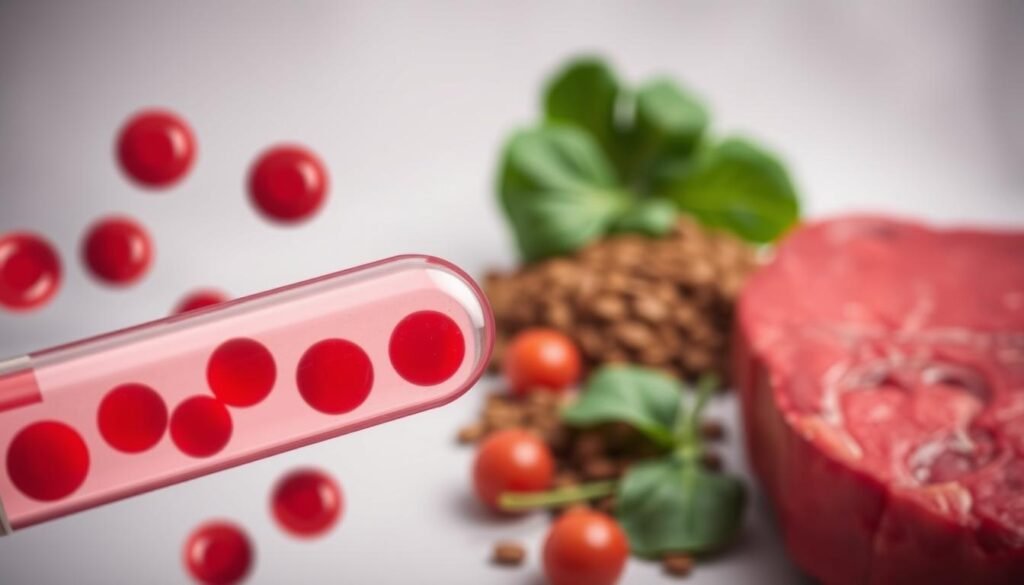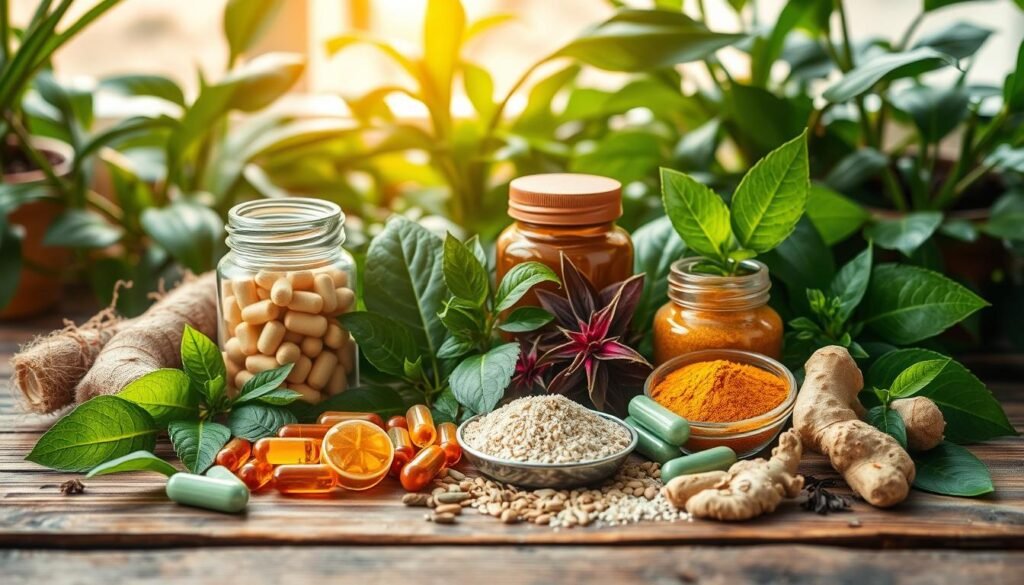Did you know the brain uses about 20% of the body’s total energy? Fatigue is common and often tied to not getting enough nutrients. This can affect your body and mind. Instead of reaching for caffeine, think about vitamins for fatigue. They can offer natural energy boosts for everyday life.
Supplements are key in fighting fatigue if your diet isn’t enough. They can fill in nutritional gaps, helping you regain energy. Vitamin B complex and iron are important for energy. They are good for anyone wanting to boost their energy naturally.
To learn more about boosting energy, explore dietary supplements that might help.
Key Takeaways
- Fatigue is often caused by nutrient deficiencies, particularly in vitamins.
- B vitamins are crucial for energy production and metabolism.
- Iron and magnesium are essential minerals that help combat fatigue.
- Integrating natural energy solutions can have lasting benefits.
- Consulting healthcare professionals can guide the right supplement choices.
Understanding Fatigue and Its Causes
Fatigue is common and comes from many sources, like health issues and lifestyle choices. It might be a sign of conditions such as chronic fatigue syndrome, arthritis, and autoimmune diseases. Knowing the fatigue causes helps in dealing with it better.
Our lifestyle has a big impact on feeling tired. Not moving much, eating poorly, and too much stress can make us tired. For instance, people with adrenal fatigue find it hard to stay energized. This is because stress messes up their hormones. Mental health problems like anxiety and depression can also make fatigue worse. This creates a tough cycle to break.
If tiredness doesn’t go away after two weeks, see a doctor. They can tell if it’s because of your lifestyle or something more serious. If fatigue comes with scary symptoms like rectal bleeding or an irregular heartbeat, you need quick help.
To fight fatigue, making healthy changes in your life is key. Drinking plenty of water, eating well, exercising, and managing stress can help a lot. For example, exercise can make you sleep better and feel happier, helping against constant tiredness.
Sometimes, fatigue is due to anemia, especially in women who can have children. It’s important to treat the reasons behind it, either by changing what you eat or taking medicine. Getting back your energy and wellbeing is the goal.
| Fatigue Causes | Examples |
|---|---|
| Lifestyle Factors | Poor diet, lack of exercise, stress management issues |
| Chronic Health Conditions | Chronic fatigue syndrome, anemia, hormonal imbalances |
| Mental Health Conditions | Anxiety, depression, postpartum depression |
| Infections | COVID-19, flu, mononucleosis |
How Vitamins Contribute to Energy Production
Vitamins are key to turning food into energy. Specifically, B vitamins like B1, B2, B3, B5, B6, and B12 play a big role. They help with enzymatic reactions that convert what we eat into energy.
Lacking enough vitamins and minerals is common globally. Many people don’t get the essential nutrients they need. For example, 68% of women in Mexico are not getting enough folate. More than half the adults in Turkey are short on thiamine. This shows why a diet full of important vitamins is essential.
Vitamin B12 is crucial for making energy, with adults needing about 2.4 micrograms a day. Our bodies can store a lot more B12 than we need daily. Still, not getting enough over time can cause fatigue. This is especially true for older people, vegetarians, and vegans.
Some people take vitamin supplements to try to boost their energy and health. They hope to lessen tiredness and sharpen their minds. Even though many believe in these benefits, scientific proof is not strong. Most evidence comes from studies on severe deficiencies.
Knowing how vitamins help us produce energy is key. It shows why getting enough vitamins through food or supplements is important. Here’s a quick look at important B vitamins and their roles:
| Vitamin | Function in Energy Production | Deficiency Effects |
|---|---|---|
| Vitamin B1 (Thiamine) | Aids in converting carbohydrates into energy. | Fatigue, irritability, and muscle weakness. |
| Vitamin B2 (Riboflavin) | Supports the energy production from fats and carbohydrates. | Fatigue and skin disorders. |
| Vitamin B3 (Niacin) | Essential for converting food into energy. | Fatigue and digestive issues. |
| Vitamin B5 (Pantothenic Acid) | Facilitates the breakdown of fats and carbohydrates for energy. | Fatigue and mental confusion. |
| Vitamin B6 (Pyridoxine) | Involved in amino acid metabolism for energy production. | Fatigue and anemia. |
| Vitamin B12 (Cobalamin) | Crucial for nerve function and red blood cell formation. | Severe fatigue and neurological issues. |
Vitamin for Fatigue: Key Nutrients to Consider
Maintaining high energy is often linked to getting the right vitamins. Vitamins like B12 and other B vitamins are crucial. They help fight fatigue and boost energy levels. Knowing about these vitamins is vital, especially for those who might not get enough.
Vitamin B12 and Its Role
Vitamin B12 is key for making energy in our bodies. If we don’t have enough B12, we can feel really tired. People who are older, vegan, or have trouble absorbing vitamins need to be careful about B12 deficiency.
This deficiency can cause anemia. Anemia can make you feel even more tired and sluggish.
Essential B Vitamins
It’s not just B12, but other B vitamins also matter for energy. These vitamins help turn the food we eat into energy we can use. This affects how much stamina and endurance we have.
- Vitamin B1: Critical for converting carbohydrates into energy.
- Vitamin B2: Supports energy production in the heart and acts as an antioxidant.
- Vitamin B3: Involved in detoxification and thyroid hormone production; insufficient levels can lead to tiredness.
- Vitamin B5: Essential for hormone production and converting food into energy, often lost during food processing.
- Vitamin B6: Vital for energy production and is particularly important for those who exercise regularly.
About 45% of people in the US feel tired all the time. Many take vitamin supplements to boost their energy. Taking B vitamins can help improve energy levels and mental health. To make enough energy, including these essential vitamins in your diet is smart.

| B Vitamin | Role | Recommended Sources |
|---|---|---|
| B1 (Thiamine) | Energy production from carbohydrates | Whole grains, beans, nuts |
| B2 (Riboflavin) | Energy metabolism and antioxidant activity | Eggs, dairy products, leafy greens |
| B3 (Niacin) | Reduces fatigue and supports detox | Meat, fish, whole grains |
| B5 (Pantothenic Acid) | Converts food into energy | Meat, avocados, broccoli |
| B6 (Pyridoxine) | Utilizes stored energy | Poultry, fish, potatoes |
Iron: A Vital Mineral Against Fatigue
Iron is key in keeping our energy up. It helps move oxygen in red blood cells. Without enough iron, we can get iron deficiency anemia. This makes us feel tired and weak. It’s important to know the usual fatigue causes linked to not having enough iron. This is especially true for people like pregnant women and those who eat certain diets.
Understanding Iron Deficiency Anemia
Every year, 4-5 million Americans find out they have iron deficiency anemia. This happens when there’s not enough iron for making red blood cells. These cells are needed to carry oxygen everywhere in the body. If you have this anemia, you might have stomach issues, feel tired, weak, and have trouble thinking. These symptoms can disrupt your life and lower its quality.
How much iron you need changes with your age and whether you’re a man or woman. Men 19 and older need 8 mg daily. Women 19-50 need 18 mg. Pregnant ladies should get 27 mg. And moms breastfeeding need about 9-10 mg. To get enough iron, eat foods like poultry, red meat, fish, greens, beans, and whole grains. If you’re not getting enough, taking 150-200 mg of iron each day can help. Learn more about iron intake.
Iron deficiency can come from not eating enough iron-rich foods, losing blood, or needing more iron at certain times. Children, women who have periods, and pregnant women need more iron. Eating foods high in iron can help avoid iron deficiency anemia and its related tiredness.
To help your body take in more iron, eat foods high in vitamin C like strawberries, citrus fruits, and bell peppers with your iron-rich meals. This combination is key to staying energetic and healthy.

| Demographic | Recommended Iron Intake (mg/day) |
|---|---|
| Men aged 19+ | 8 |
| Women aged 19-50 | 18 |
| Pregnant Women | 27 |
| Breastfeeding Mothers | 9-10 |
| Children 1-3 years | 9 |
| Children 4-8 years | 10 |
Herbal Supplements for Energy Boosting
Herbal supplements are gaining popularity for boosting energy and fighting fatigue. Ashwagandha and rhodiola rosea are especially noted for their benefits.
Ashwagandha: Stress Reducer and Energy Enhancer
Ashwagandha, an adaptogen, helps reduce stress and increase energy. A study found that 600 mg of ashwagandha root extract daily can improve focus and sleep. It’s chosen by those looking for natural mental and wellness support. Ashwagandha combines stress relief with energy boost, perfect for improving vitality naturally.
Rhodiola Rosea: Combatting Physical and Mental Fatigue
Rhodiola rosea is known for its ability to fight fatigue. A 400 mg daily dosage has been shown to reduce exhaustion and boost focus. It enhances both physical and mental performance, offering a safe energy boost.

To get the most out of these supplements, combine them with a healthy lifestyle. Eat well, sleep enough, and stay active for better energy and well-being. For more info on energy-boosting herbs, check out this resource. Also, explore natural fatigue treatments here.
The Importance of Electrolytes in Energy Levels
Electrolytes are key for staying hydrated, nerve function, and muscle movement. These minerals, like sodium, potassium, magnesium, and calcium, keep our energy up by managing body functions. If we don’t have enough, we can feel tired, have weak muscles, and feel more sluggish. So, keeping an eye on how much we get is very important.
Understanding Electrolyte Imbalance
Many things can throw off our electrolyte balance, such as a lot of vomiting, diarrhea, sweating a lot, or certain medicines. A frequent issue is hyponatremia, which happens when there’s too little sodium. This often lands people in the ER. It’s really important to stay hydrated and manage our electrolyte levels for our health.
Adults should get 2,300 mg of sodium daily, but less is better for the heart. Men need 3,400 mg of potassium and women need 2,600 mg a day. Eating foods high in these minerals is a good idea.
Eating superfoods is a great way to up our electrolyte intake. Bananas, greens, nuts, and dairy have lots. Drinking water or sports drinks also helps, especially when we’re active.
But, watch out for sugary sports drinks. For kids in sports, water usually does the trick. It’s also good to cut down on sugary drinks to keep a healthy weight. Knowing how to manage electrolytes helps us keep our energy up and stay healthy.
Melatonin and Sleep Quality
Melatonin is key for good sleep. Our body’s natural melatonin decreases as we get older. This drop can make sleeping hard. People might have trouble sleeping and feel more tired during the day. Knowing how melatonin helps could be a game-changer.
How Sleep Deprivation Contributes to Fatigue
Not getting enough sleep leads to feeling worn out. Research shows melatonin can help you fall asleep faster. It’s especially good for those with sleep troubles. This hormone helps keep our sleep cycles on track.
Studies show melatonin can make sleep better. It also eases jet lag symptoms and daytime sleepiness. Even people with Alzheimer’s can find relief, as it soothes evening agitation.
Kids who don’t sleep well might benefit from melatonin too. This is especially true for those with special needs or blindness. It’s usually safe for short-term use. However, talking to a doctor first is important. This helps avoid any side effects like headaches. It’s also key to check it won’t mix badly with other medicines.
Integrating Vitamins into Your Diet
Adding vitamins to your daily diet can really help fight tiredness. Eating a variety of foods that are full of important nutrients boosts your energy and health. Foods that have a lot of iron, vitamin B12, and vitamin D are great for overcoming vitamin shortages.
Here are some good foods to eat:
- Iron-rich foods: Red meat, lentils, beans, and spinach are great for healthy blood.
- Vitamin B12 sources: Eggs, milk, and cereal that has extra vitamins keep your nerves working well and give you energy.
- Vitamin D sources: Fatty fish and dairy products, plus getting some sun, help with strong bones.
- Magnesium sources: Eating nuts, seeds, whole grains, and greens fights off tiredness.
- Vitamin C sources: Citrus fruits and bell peppers help your immune system and keep you energized.
Along with eating right, supplements can fill in gaps in your nutrition. Things like coenzyme Q10, creatine, and ginseng can really help make more energy and lessen tiredness.
Planning meals is a key step for lasting energy. Mix a variety of foods rich in nutrients, keep an eye on your vitamin intake, and use energy-boosting supplements for strong nutritional support.
Look at this table for an overview of vitamins that help with energy and where to find them:
| Vitamin/Mineral | Sources | Benefits |
|---|---|---|
| Iron | Red meat, lentils, spinach | Prevents fatigue and anemia |
| Vitamin B12 | Eggs, milk, fortified cereals | Supports energy levels and cognitive health |
| Vitamin D | Fatty fish, fortified dairy, sunlight | Enhances bone health and immune function |
| Magnesium | Nuts, seeds, leafy greens | Reduces physical and mental fatigue |
| Vitamin C | Citrus fruits, bell peppers | Boosts immunity and energy |
Conclusion
The path to beating tiredness often combines the best vitamins for fatigue with other natural energy boosters. Vitamins and minerals are key in making energy in cells, helping to ease tiredness. Nutrients like vitamin D are vital for keeping energy balanced by affecting stress and inflammation.
Many studies show that changing your diet and adding the right supplements can really help bring back energy. Since tiredness can come from not having enough nutrients or health issues, it’s key to tackle it head-on. By choosing the right vitamins and living healthily, you can greatly improve your energy.
Looking into various nutritional options, through food or supplements, lets you customize how you deal with tiredness. These smart choices not only fight off fatigue but also lead to a healthier, brighter life.